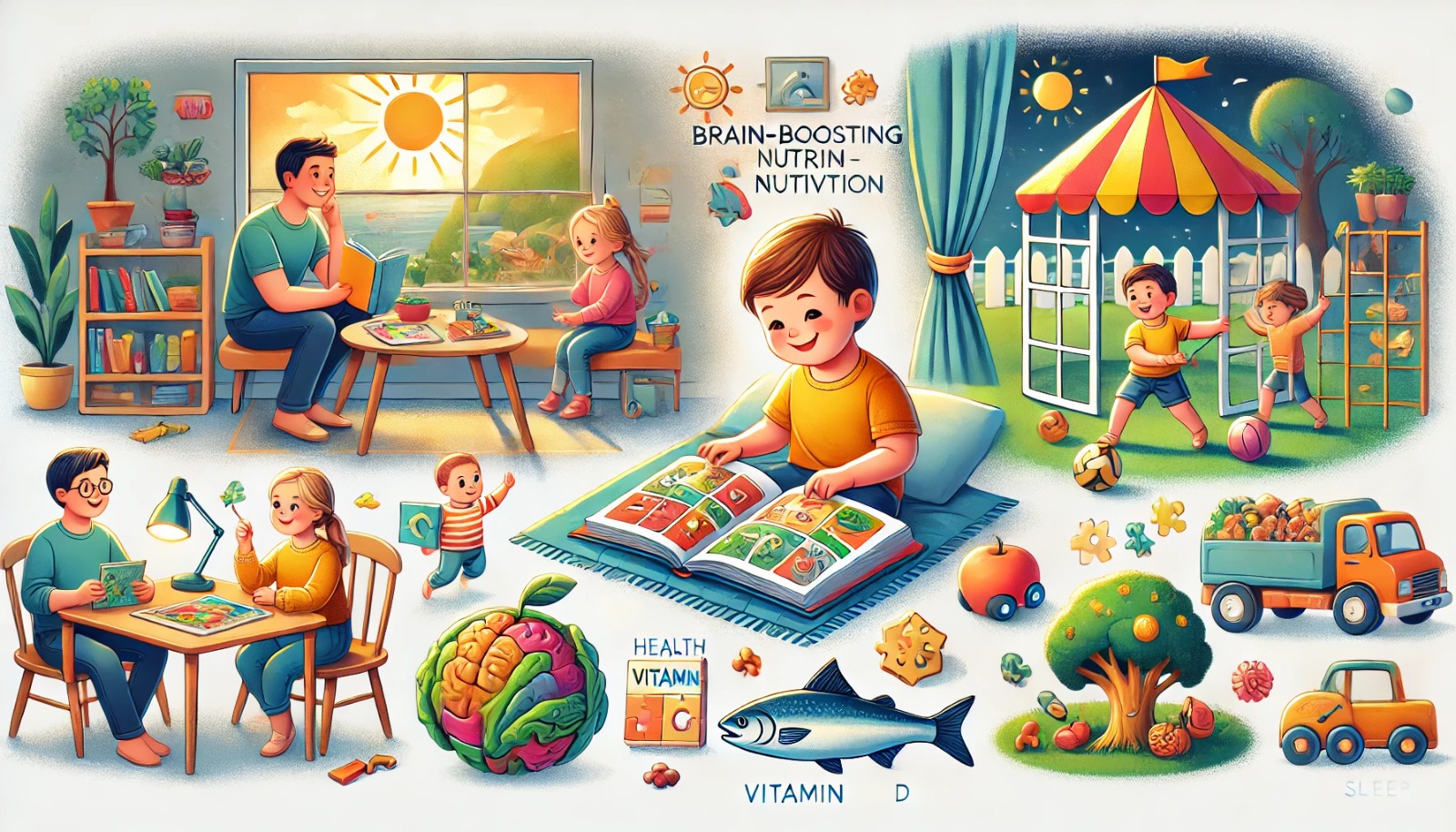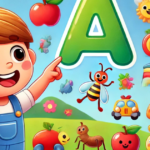Early childhood education is crucial. Preschool years (around 3-6 years old) are a prime time for foundational learning.
Introduction to Child Brain Development
Early childhood education is crucial for children. The preschool years (ages 3-6) are a prime time for learning. During this stage, a child’s brain develops quickly, making it crucial to support their cognitive skills. As a parent, your role is vital in creating an environment that promotes brain development. Here are some effective techniques and methods to help sharpen your child’s brain.
1.Nutrition for Brain Health
Best Vitamins for Child Brain Development
Proper nutrition plays a vital role in brain health. The right diet can significantly impact your child’s cognitive abilities.
- Omega-3 Fatty Acids:
Omega-3 fatty acids, found in fish oil, are essential for brain development. These fatty acids help brain cells function better. Including foods like salmon, sardines, and walnuts in your child’s diet can boost their brain health. If you prefer vegetarian options, consider flaxseeds and chia seeds. Regular intake of these foods can improve memory and concentration. - Vitamin D:
Vitamin D is crucial for brain health. It can be obtained from sunlight, fish, eggs, and dairy products. A deficiency in Vitamin D may lead to cognitive issues and mood swings, affecting your child’s learning process. Ensuring your child gets enough sunlight and including fortified foods in their diet can help maintain healthy Vitamin D levels. - Antioxidants:
Foods rich in antioxidants, such as fruits and vegetables, protect the brain from damage. Berries, like blueberries and strawberries, are particularly beneficial for your child’s brain. Antioxidants help improve brain function and enhance learning abilities. Including a variety of colorful fruits and vegetables in your child’s diet can contribute to overall health and cognitive development.
2. Engaging Activities for Cognitive Skills
Interactive Learning Techniques
Engaging activities are essential for sharpening your child’s brain. Games and puzzles can promote logical thinking and problem-solving skills.
- Storytelling:
Reading stories to your child is not just entertaining; it also improves their listening skills. You can encourage them to act out different characters, which boosts their imagination and creativity. Choose diverse books that introduce them to new concepts and cultures. This not only improves vocabulary but also broadens their worldview. - Creative Play:
Activities like drawing, painting, and crafting allow children to express their emotions. Creative play helps develop their creativity. Providing colorful building blocks can enhance their spatial awareness and fine motor skills. You can also encourage your child to create their own stories and illustrations, fostering both creativity and literacy skills. - Puzzle Games:
Puzzles and brain teasers can help improve critical thinking and problem-solving abilities. Choose age-appropriate puzzles that challenge your child’s reasoning skills. These games not only entertain but also teach patience and persistence.
3. Importance of Physical Activity
Physical Activity for Brain Function
Physical activity is not only important for physical health but also essential for brain function. Regular play releases endorphins that improve mood and reduce stress.
- Outdoor Games:
Outdoor games like running, biking, or playing team sports enhance your child’s physical fitness and social skills. Encourage your child to explore nature, which can stimulate curiosity and creativity. - Yoga and Meditation:
Practices like yoga and meditation can improve focus and concentration. These activities teach children relaxation and mindfulness, which enhance mental clarity and emotional health. Simple breathing exercises can help your child calm down during stressful situations, aiding in better focus during learning activities.
4. Creating a Supportive Environment for Learning
Home Environment for Child Development
Home Environment for Child Development
The environment at home significantly impacts a child’s development. Creating a space that encourages curiosity is crucial.
- Regular Reading:
Setting aside time each day for reading can benefit your child greatly. Choose age-appropriate books that interest them. Reading improves vocabulary and comprehension skills. You can create a cozy reading nook to make this time special and inviting. - Limit Screen Time:
In today’s digital age, controlling screen time is essential. Excessive screen time can negatively affect a child’s brain. Encourage outdoor activities and educational games instead. Use screen time as a reward for completing learning tasks to reinforce positive behavior. - Learning Spaces:
Designate specific areas for learning activities, such as art projects or homework. A clutter-free, well-organized space can help your child focus better on tasks.
5. The Power of Sleep for Brain Health
Importance of Sleep for Cognitive Function
Sleep plays a significant role in brain health. Quality sleep enhances your child’s concentration, memory, and overall cognitive function.
- Bedtime Routine:
Establishing a calming bedtime routine is important. Reading a story or playing soft music can help your child relax and get better sleep. Consistency in bedtime routines can signal to the brain that it’s time to wind down. - Consistent Sleep Schedule:
Putting your child to bed and waking them up at the same time every day helps set their biological clock, which is crucial for their development. Make sure your child is getting the recommended hours of sleep for their age group, which is essential for their brain health.
6. Encouraging Social Interaction for Learning
Social Interaction for Cognitive Development
Social interaction is beneficial for a child’s brain. Playing with friends improves communication skills and fosters learning.
- Group Activities:
Involving your child in group activities, such as music classes, dance lessons, or sports teams, teaches them social skills and discipline. These experiences can build teamwork and leadership qualities. - Encourage Conversations:
Allowing your child to participate in conversations at home helps improve their language skills. It also gives them the opportunity to express their thoughts and feelings. Engage them in discussions about their day, encouraging them to elaborate on their experiences.
7. Mental Exercises and Challenges
Boosting Brain Power Through Challenges
Just like physical fitness, brain fitness is essential for cognitive development. Incorporating mental exercises can sharpen your child’s mind.
- Memory Games:
Play memory games that require your child to remember patterns or sequences. These games enhance memory retention and improve focus. - Brain-Boosting Apps:
Consider using educational apps that challenge your child’s problem-solving skills. These apps can be a fun way to learn while keeping your child engaged. - Math and Logic Games:
Engaging your child in math puzzles and logic games can help improve their analytical thinking. You can find many fun games that make learning math enjoyable.
Conclusion: Enhancing Child Brain Development
Supporting your child’s brain development is crucial during their early years. By providing a balanced diet, engaging activities, physical exercise, and a nurturing environment, you can enhance their cognitive skills. These strategies will help your child become a confident and capable individual. Remember that every child is unique, and what works for one may not work for another. Stay patient and consistent, and celebrate your child’s progress along the way!









